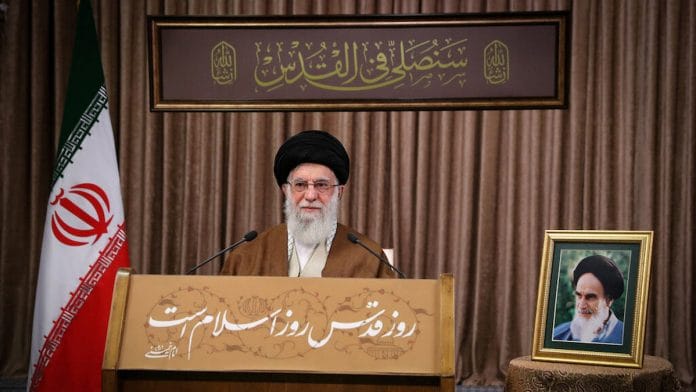London: The breakthrough between Israel and the United Arab Emirates reflects a shift in the modern Middle East’s foundational fault-line, as a Persian Gulf power for the first time agrees to make peace with the Jewish state. But it also shows how it’s been replaced with another, perhaps more dangerous rift over Iran.
Sitting just across the narrow Strait of Hormuz from the Islamic Republic, the UAE has been careful not to let tensions boil over into open conflict while President Donald Trump’s “maximum pressure” policy, which it backed, isolated and sanctioned Tehran, and then led to the killing of its most influential general.
But by cementing years of discreet relations with Iran’s biggest foe in a diplomatic breakthrough — a model other Persian Gulf states including heavyweight Saudi Arabia might follow — the sheikhdom is cautiously nailing its colors to the containment mast.
Officials in the U.S. and Israel lost no time in interpreting Thursday’s announcement as one that should make Iranian leaders nervous. Outgoing American envoy for Iran Brian Hook called it a “nightmare” for the country. Israeli Prime Minister Benjamin Netanyahu said the UAE saw “the strength that we demonstrate here in the region, the fact that I don’t hesitate to confront Iran.”
Both statements need substantial caveats, regional analysts cautioned. And in his only public statement so far, UAE Crown Prince Mohammed Bin Zayed emphasized Netanyahu’s pledge to suspend potentially explosive plans to annex West Bank land wanted by the Palestinians for a future state — rather than the anti-Iran element of the move.
“I think the Emiratis were concerned about the tensions escalating and knew that they would play out in the region broadly especially in the Persian Gulf,” said Ariane Tabatabai, Middle East Fellow at the German Marshall Fund. “They saw Trump as unreliable and so the best way to handle stuff was to take it into their own hands.”
Dina Esfandiary, a fellow at The Century Foundation, said the perception that the U.S. is “leaving the region” was a driving factor. She didn’t see it substantially deepening the current level of isolation facing Iran.
The outline of the agreement enables the UAE to develop diplomatic, commercial and even defense ties with Israel while negating criticism by pointing to the concession over West Bank land. An embattled Netanyahu can claim a major success and put his unilateral annexation plan — which posed security and diplomatic risks for Israel — to one side for now. Meanwhile Trump can savor a foreign-policy success as he trails in the polls ahead of November’s election.
Also read: Why UAE chose to normalise diplomatic relations with Israel
‘Wretched agreement’
“Iran is a big part of this story but it’s not the only part,” said Sanam Vakil, deputy head and senior research fellow of the Middle East and North Africa Program at Chatham House. Taking the lead on normalizing ties with Israel is also about “the UAE in general seeking to take a larger role as a regional actor in the Middle East,” Vakil said.
In Tehran, the reaction was predictably hostile. One government minister called the pact a “wretched agreement” for its betrayal of the Palestinians and its bolstering of an anti-Iran axis that Trump has cajoled. The UAE and its allies will be responsible for “any Israeli intervention in the Persian Gulf region,” Iran’s Foreign Ministry said on its official Telegram channel on Friday. Iran and its allies, including the Lebanese Hezbollah group, will be further empowered by the move, it added.
Tensions in the Persian Gulf remain high after a year of attacks on oil facilities and tankers, culminating in the U.S. assassinating the military architect of Iran’s foreign policy, Qassem Soleimani. The six-member Gulf Cooperation Council has been split for three years by an embargo of Qatar, in part over its links to Iran. The Gulf monarchies share with Israel an interest in pushing back against political Islam, which they view as a destabilizing influence primarily emanating from Qatar, Iran and Turkey.
Turkey ties
As Iran found itself increasingly isolated, the UAE has sought to calm relations with the Islamic Republic, sending officials to Tehran and ratcheting down its role in the Saudi-led alliance fighting Iran-backed rebels in Yemen. The countries are close neighbors with historically deep trade links that straddle the world’s leading chokepoint for oil supplies.
If it’s able to win a receptive audience for that more cautious response among Israeli and U.S. officials, Thursday’s agreement could even lead to a lowering of tensions, Tabatabai said. Iran, with its economy severely weakened by U.S. sanctions and a major coronavirus outbreak, is unlikely to want the pact to upend recent improvements in its relationship with the UAE, also a trade partner.
Another consequence could be a deepening of ties between Iran and Turkey to build a bulwark against a U.S.-backed axis of Arab countries willing to establish a working relationship with Israel.
Turkey, whose alliance with Israel collapsed under the weight of President Recep Tayyip Erdogan’s increasing support for Palestinian groups including Hamas, slammed the agreement for violating Palestinian rights.
“There might be a step to suspend the diplomatic relationship with the administration in Abu Dhabi, recalling the ambassador,” Erdogan told reporters following the Friday prayer in Istanbul. “We stand by the Palestinian people.”
Iran and Turkey have pragmatic ties backed by strong trade relations, said Vakil at Chatham House. The accord will “probably accelerate this sort of two-tier division that’s taking place in the region,” she said, adding that Turkey’s dispute with Israel over energy resources in the Eastern Mediterranean will also push Ankara and Tehran closer.
“It all points to the fact that the center of gravity for the region now is clearly in the Persian Gulf.” –Bloomberg
Also read: This is what Israel, UAE and US get from the diplomatic breakthrough in Middle East






